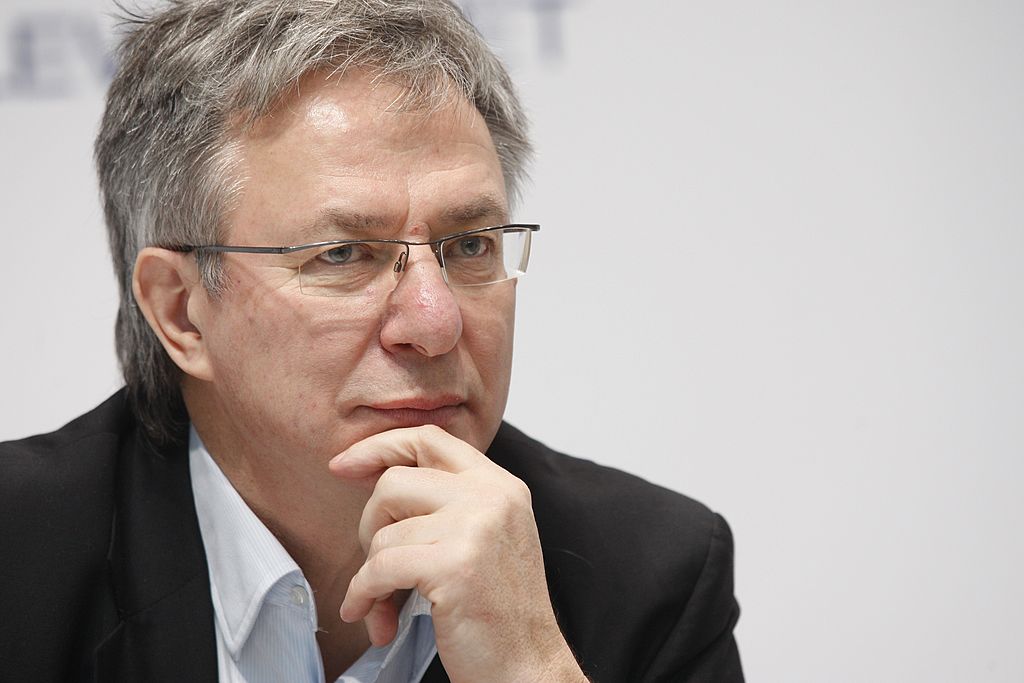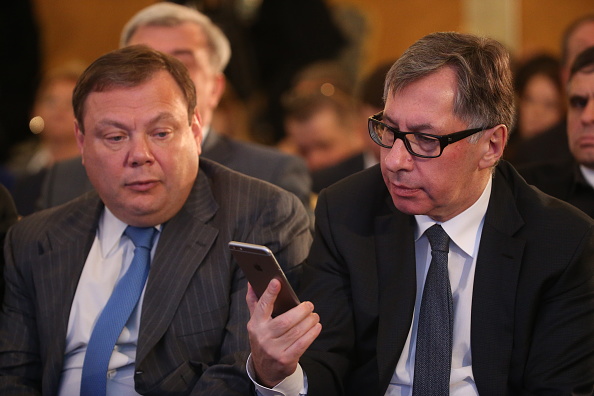One partner, Silicon Valley Bank, recently has been vetting his firm, Almaz Capital, “and we needed to prove that we are a good fund,” Galitsky said in an email to PitchBook. “The problem is that our first fund was named Almaz Capital Russia Fund I, and the word [Russia] got new attention.”

(Thomas Samson/Getty Images)
Almaz has $375 million under management, according to PitchBook data, and has invested in dozens of startups in the US, Russia and parts of Eastern Europe.
Galitsky, though, has other Russian connections that likely make his firm stand out. Until recently, he served on the board of Alfa-Bank, a Russian institution that is under Western sanctions, along with two oligarchs, Mikhail Fridman and Petr Aven, who are both targeted as individuals by the EU. In March, Galitsky, Fridman and Aven all resigned from Alfa’s board a day after the bank was added to the sanctions list.

(Mikhail Svetlov/Getty Images)
Galitsky, for his part, said that Western partners needn’t worry about him. He said his firm doesn’t have Russian financial backers. Almaz’s latest fund is prohibited by its anchor LP, the European Bank for Reconstruction and Development, from investing in Russia. EBRD, an affiliate of the World Bank, stopped funding projects in Russia after Moscow seized the Crimean Peninsula in 2014. And he said he was on Alfa-Bank’s board to help fintech startups in Ukraine as the bank was very active in that country before the invasion.
A spokesperson for Silicon Valley Bank declined to comment.
These are complicated times for venture capitalists with Russian or former Soviet Union ties who are based in the US and other Western countries that are isolating Russia as punishment for waging war on Ukraine. The opaque structure of private funds, normally seen as an advantage for VCs, has hobbled their ability to demonstrate whether they have problematic business links to Russia.
About 150 venture firms are either based in Russia or headquartered outside the country and managed by GPs who hail from Russian-speaking countries, according to an estimate by Alexey Soloviev, founder and CEO of A.Partners, a Moscow-based financing advisory and VC firm.
Screening LPs
Many Western VC firms led by Russian-speaking investors have LPs with recent personal or financial ties to the former Soviet Union. These firms must do more than answer questions from business partners. They need to be especially vigilant about screening their LPs for recently sanctioned oligarchs and Russian government officials.
This is a problem Galitsky says he is happy not to worry about, noting in an email: “Our first fund was a great success and many Russian businessmen wanted to become our LP. I was against that especially. I was strongly against any government funding.”
But many other Russian-speaking managers accepted capital from that country, and they now must sort out the consequences.
“Before Russia invaded Ukraine, you knew all the folks on the sanctions list. You knew who you would want to avoid doing business with,” said attorney Leonard Grayver, who represents many Russian-speaking venture capitalists and tech founders who are part of the Soviet Union diaspora and are now active in Silicon Valley. “Now the sanctions net has been cast much wider, and it caught people you would not expect to be on the sanctions list [before].”
A handful of firms have identified so-called toxic backers among their LPs, according to Grayver. He declined to name those firms.
Grayver Law, the California firm that he heads, represents Bay Area VC firms such as Runa Capital and Grishin Robotics as well as Israel’s AltaIR Capital—an early investor in Miro, a business collaboration company last valued at $17.5 billion.
Compliance with US rules
If US or other Western officials sanction an entity or a person, their capital is considered toxic and investors must freeze their funds. Some VC funds may even decide to expel LPs who haven’t been sanctioned but may be considered a liability because of their ties to blacklisted entities.
Under US law, private funds aren’t required to disclose the identity of their investors to portfolio companies, or even to other LPs in the fund. But Russia’s invasion of Ukraine and the subsequent waves of sanctions have prompted some lawmakers to propose new disclosure rules.
The increased scrutiny is raising the stakes for portfolio companies to make sure that funds invested in them comply with all regulations, including blocking sanctioned backers. Startup founders, Grayver says, should ask their VC backers to ensure they know the identities of their funds’ LPs.
In addition to causing potential legal problems, accepting capital from funds with sanctioned investors could be damaging to a startup’s reputation.
Investing in a fund alongside sanctioned LPs is also seen as a reputational risk for some limited partners.
“We don’t necessarily know all the other LPs in the fund, and if a negative headline came out that we are a partner with a Russian oligarch, it would be a disaster,” said an investor who helps run a state pension plan.
Ayako Yasuda, a professor of finance at the Graduate School of Management at the University of California, Davis, said that all future limited partner agreements with VCs should include a contingency clause that spells out a mechanism for disclosing and potentially expelling “questionable” LPs from the fund.
“We are in a different geopolitical era now,” Yasuda said. “Even an appearance of a conflict is enough [to cause problems].”
Grayver said he started including this type of provision in LP agreements a few years ago.
“Anybody who is remotely suspect, even if they had lunch with somebody on the sanctioned list, can be kicked out of the fund,” he said. “LPs don’t like it, but this gives GPs leeway to expel the people who can damage the fund’s reputation.”
For additional caution, Grayver has been advising clients to treat anyone who is a vocal supporter of the Putin regime as if they were already on the sanctions list. “I know LPs who are on the wrong side of history,” he said. “I don’t understand why, but it happens.”
Selling stakes in funds
After an entity has been sanctioned, their funds must be frozen and reported to the Treasury’s Office of Foreign Assets Control. That is why investors who may in the future end up on the sanctions list are now being approached by other investors who offer to buy out their LP stakes—sometimes at deep discounts.
Grayver said that GPs who have some sanctioned LPs have been squeezed into selling their stakes in portfolio companies at 20 cents on the dollar. And Russian-speaking GPs aren’t the only fund managers who have received Russian capital.
Many well-known funds have been backed by Russian investors, including in some cases from oligarchs, according to Victor Orlovski, a partner at Fort Ross Ventures, a Silicon Valley-based firm that was initially backed by the now-sanctioned Sberbank. But most of Fort Ross’ capital, Orlovski said, comes from small tech entrepreneurs who aren’t subject to any sanctions.
“I sometimes hear from those top-tier funds that they don’t want to co-invest with us,” he said. “I would argue that they are more sanctioned than we are because they have more toxic money than we do in total fund commitments.”
Featured image by Max Ryazanov/Getty Images
Credit: Source link


Comments are closed.